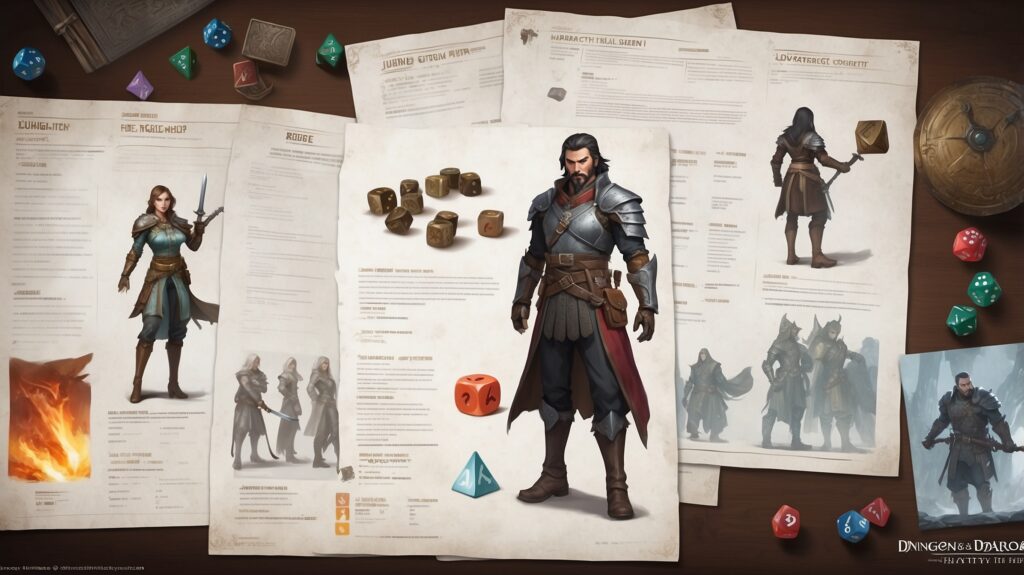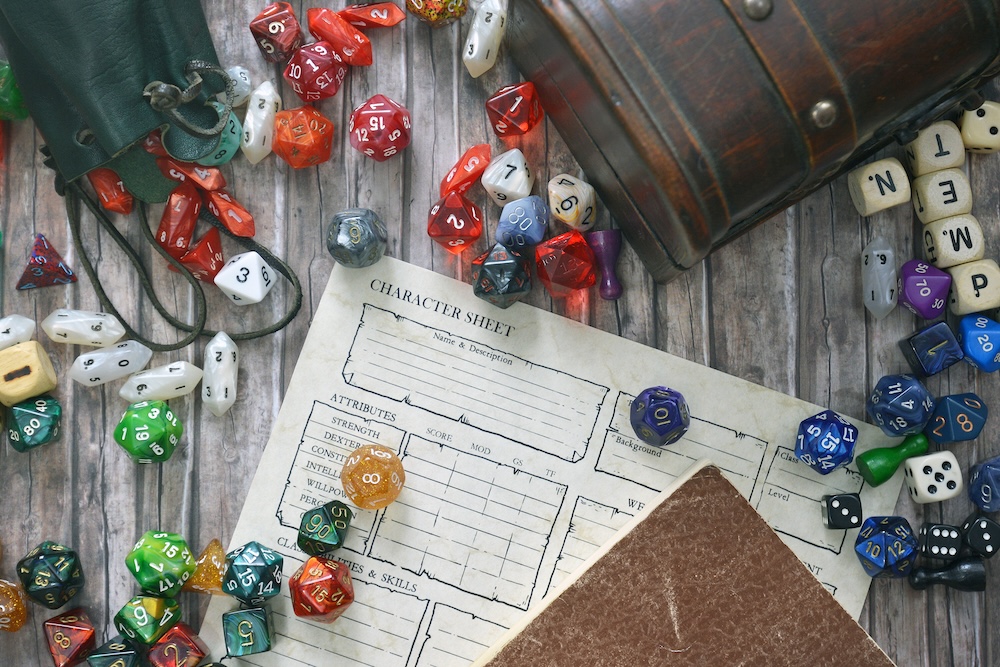Welcome, adventurers! A D&D Character Sheet is your gateway to the incredible worlds of Dungeons & Dragons, serving as both your character’s lifeline and a roadmap for their epic journey. Whether you’re a seasoned player or brand new to the game, your character sheet is essential for tracking stats, abilities, and equipment while bringing your character to life. But don’t worry—filling one out is easier than you think!
This guide will walk you through everything you need to know about D&D character sheets, from understanding the basics to diving into class-specific details. Plus, we’ve included downloads for a variety of blank character sheets, so you can jump straight into the action!
Downloads: Blank Character Sheets for Every Adventurer
We’ve made it easy for you to get started with our collection of downloadable character sheets. Whether you need a standard sheet or something tailored to your class, we’ve got you covered.
- Standard Character Sheet: Perfect for any adventurer.
- Class-Specific Sheets: Custom-tailored sheets for specific classes like wizards, rogues, and clerics, with sections optimized for their unique abilities and spellcasting needs.
- Beginner-Friendly Sheets: Simplified sheets for new players, with helpful labels and tips for filling out each section.
- Advanced Sheets: For experienced players who want extra detail, including space for extensive spell lists and equipment.
Download Blank Character Sheet
Download Class-Specific Character Sheets
What is a D&D Character Sheet?
A D&D Character Sheet is essentially your character’s blueprint. It’s a paper form you’ll have with you at the table that captures all the vital information about your character, including:
- Basic Details: Name, race, class, alignment, and background.
- Attributes: Your character’s ability scores like Strength, Dexterity, and Charisma, which determine their skill checks and combat performance.
- Skills and Proficiencies: Specific areas where your character excels, such as Stealth, Arcana, or Persuasion.
- Equipment: Weapons, armor, magical items, and anything else you’ve picked up along the way.
- Spells: For spellcasting classes, this section tracks your known spells, spell slots, and magical abilities.
- Hit Points and Combat Stats: Your health, armor class, initiative, and attack bonuses.
Think of your character sheet as your personalized command center—it’s where all the important details about your adventurer live, ensuring you can quickly reference abilities, items, and stats during play.
Types of D&D Character Sheets
Not all character sheets are created equal! While the standard sheets provided by the game are fantastic for most players, there are plenty of variations out there that cater to different needs and playstyles. Whether you’re a beginner looking for simplicity or a seasoned adventurer who needs extra space for detailed notes and custom features, there’s a character sheet for you. Let’s explore the main types of character sheets and what makes each unique.
1. Standard Character Sheets
These are the sheets you’ll find in the official D&D rulebooks or starter sets. Designed to be versatile and beginner-friendly, standard sheets include all the core sections you need to track your character’s abilities, stats, equipment, and spells. They’re great for most players and cover all the basics, such as:
- Ability scores and modifiers.
- Skills and proficiencies.
- Combat stats (hit points, armor class, etc.).
- Inventory and equipment.
- A section for spellcasters to list their spells and slots.
While perfectly functional, standard sheets can feel a bit cramped if you have a lot of notes or complex character details to manage.
2. Class-Specific Character Sheets
Class-specific sheets are customized for the unique needs of each class. These are a dream come true for players who want tailored features and better organization for their character’s abilities.
- Spellcasting Classes: Sheets for wizards, sorcerers, or clerics might include expanded spellcasting sections with room for spell descriptions, spell slot tracking, and detailed notes for prepared spells.
- Martial Classes: Sheets for fighters, barbarians, or rogues often have dedicated sections for tracking combat maneuvers, special abilities like rage or sneak attack, and more space for weapons and gear.
- Hybrid Classes: For classes like paladins or rangers, these sheets balance spellcasting sections with combat tracking, giving equal weight to both aspects of their playstyle.
Class-specific sheets are ideal for players who want a more organized, focused layout that highlights their class’s unique features.
3. Expanded or Robust Character Sheets
If you’re a detail-oriented player or someone who loves keeping meticulous records, expanded sheets are the way to go. These sheets go beyond the basics to provide additional space for:
- Game Notes: Dedicated sections for jotting down key NPC names, quest objectives, or memorable moments.
- Inventory and Treasure: Extra space to track gear, magical items, and all the treasure you’ll inevitably hoard.
- Custom Features: Fields for tracking feats, multi-class abilities, or homebrew mechanics.
These sheets are perfect for long-running campaigns where your character evolves over time, and you want a comprehensive record of their journey.
4. Simplified Character Sheets
For new players or one-shot games, simplified character sheets offer a streamlined experience. These sheets focus only on the essentials, with fewer details to worry about. They’re great for learning the ropes or quickly creating a character for a short-term game.
- Clearly labeled sections guide new players through the process of filling them out.
- Fewer distractions make gameplay smoother and less overwhelming for beginners.
Simplified sheets are also handy for younger players or casual groups that prioritize fun over mechanics.
5. Digital Character Sheets
In the digital age, more players are turning to online tools and apps for their character sheets. Platforms like D&D Beyond, Roll20, and Foundry VTT offer interactive digital sheets that can handle calculations, automate spell tracking, and even update stats dynamically during gameplay.
- Auto-Calculations: Digital sheets often calculate modifiers, saving throws, and skill bonuses for you.
- Spell Management: Easily add, remove, or prepare spells with a few clicks.
- Cloud Storage: Access your character sheet from anywhere, and never worry about losing it.
Digital sheets are ideal for online campaigns or players who prefer a tech-savvy approach to their adventures.
Which Type is Right for You?
Choosing the right character sheet depends on your personal playstyle and the needs of your campaign. If you’re new to D&D, start with a standard or simplified sheet to learn the basics. If you’re playing a spellcaster or a complex build, consider class-specific or expanded sheets for better organization. And if you’re diving into a digital campaign, digital sheets might be the most convenient option.
No matter which type you choose, your character sheet is your trusty companion throughout your adventures, so make sure it fits your needs and helps bring your hero to life!

How to Fill Out a D&D Character Sheet
Your D&D Character Sheet is the ultimate tool for managing your character’s information throughout your adventure. It keeps track of everything from your stats and abilities to your gear and spells, ensuring you’re always ready for whatever the dungeon throws your way. Here’s a breakdown of how to use each section of your character sheet effectively during gameplay.
Basic Details
At the top of your character sheet, you’ll find spaces for your character’s name, class, race, alignment, and background. These are your character’s broad strokes, helping you and your party keep track of who’s who. While they won’t change often, it’s always good to double-check these details when leveling up or roleplaying to stay consistent.
Ability Scores and Modifiers
Your ability scores—Strength, Dexterity, Constitution, Intelligence, Wisdom, and Charisma—are central to how your character interacts with the world. Each score has a modifier, which is used in skill checks, saving throws, and combat.
- Using Modifiers: When you make a skill check, add the relevant ability modifier (and proficiency bonus if applicable) to your dice roll. For example, a Stealth check uses your Dexterity modifier.
- Tracking Temporary Changes: If your scores or modifiers are temporarily altered by spells, conditions, or magic items, make a note of the changes so you can easily adjust your rolls.
Skills and Saving Throws
The skills section lists all the specific abilities your character can use, such as Perception, Athletics, and Arcana. The sheet will show which skills you’re proficient in and calculate their bonuses for you. Similarly, saving throws (e.g., Dexterity saves to dodge traps) are listed in their own section.
- Quick Reference: Use this section as your go-to for skill checks during exploration, combat, or roleplaying.
- Highlight Proficiencies: Make sure to note which skills and saves you’re proficient in—they often make the difference between success and failure.
Combat Stats
The combat section of your character sheet is critical for encounters. Here’s how to use it effectively:
- Armor Class (AC): This determines how difficult you are to hit. Reference it whenever an enemy attacks you to see if their roll beats your AC.
- Initiative: Use your initiative modifier to determine your turn order in combat. This is usually based on your Dexterity modifier.
- Hit Points (HP): Track your current and maximum HP. Update this every time you take damage or heal, and don’t forget to check your temporary HP if applicable.
- Attacks and Spellcasting: Use this section to record your main attacks, weapons, or spellcasting details, including attack bonuses and damage dice. Write down frequently used spells or special abilities for quick reference during combat.
Equipment and Inventory
The inventory section tracks everything your character is carrying, from weapons and armor to magical items and mundane gear.
- Keep It Organized: Group similar items together, like potions or tools, to make it easier to find what you need in the heat of the moment.
- Track Weight: If your DM enforces carrying capacity rules, make sure to update your inventory weight as you collect treasure or discard items.
- Special Items: For magical items, jot down their effects and activation methods so you can use them without digging through rulebooks mid-session.
Spells and Spellcasting
If your character can cast spells, this section of your sheet will be your lifeline during combat and roleplay.
- Spell Slots: Track your spell slots here, marking off each one as you cast spells. Reset them during a long rest.
- Known and Prepared Spells: List the spells your character knows or has prepared, including their level, casting time, range, and effects.
- Spell Save DC and Attack Bonus: These values determine how hard it is for enemies to resist your spells or avoid their effects. Write these down at the top of the spells section for quick access.
Features and Traits
This section is where you record your class abilities, racial traits, and any unique features gained from feats or background.
- Passive Abilities: Write down abilities that don’t require activation, such as Darkvision or damage resistances.
- Active Abilities: For abilities you activate, like Second Wind or Rage, include usage limits (e.g., “1/day”) so you can track them easily during play.
Notes and Personality Details
The notes section is your space to record anything that doesn’t fit elsewhere on the sheet. Use it for:
- NPC names and relationships.
- Quest objectives and rewards.
- Roleplaying details like your character’s personality traits, ideals, bonds, and flaws.
Keeping this section updated will help you stay engaged with the story and roleplay consistently.
Tips for Using Your Character Sheet
Your character sheet is more than just a stat tracker—it’s your key to fully engaging with the game. Keep it updated, reference it often, and don’t be afraid to make notes or add details as the campaign unfolds. With your sheet in hand, you’ll always be ready for the next adventure, whether it’s battling dragons, navigating ancient ruins, or bluffing your way into a villain’s lair.
1. Keep It Updated
D&D is a dynamic game where your character grows and evolves. Make sure your sheet reflects these changes:
- Track Level Ups: Update ability scores, proficiency bonuses, new features, and hit points whenever your character levels up.
- Log Treasure and Gear: Add new items as you acquire them and cross out or erase anything you sell, trade, or lose.
- Adjust Spell Slots and Features: After each combat or rest, make sure to restore spell slots, hit points, or ability uses as applicable.
Keeping your sheet updated ensures you’re always prepared for the next encounter or roleplay moment.
2. Take Notes During Gameplay
Your character sheet can double as a mini-journal for your campaign. Use the notes section (or margins!) to jot down important details:
- NPC names, roles, and quirks.
- Clues, objectives, and locations from quests.
- Memorable quotes, critical moments, or funny in-game events.
These notes not only help you stay engaged but also come in handy when you need to reference past events. Plus, they make your sheet a great snapshot of the story when the campaign ends.
3. Keep It Tidy
Combat can get intense, and a messy sheet makes it harder to find what you need quickly. Keeping things organized will save time and reduce frustration:
- Group Items: Organize your inventory into categories (e.g., weapons, potions, tools) so you can find what you need fast.
- Highlight Key Features: Use a highlighter or underline important abilities, especially ones you often forget to use (like reaction abilities or bonuses).
A tidy sheet also makes it easier to hand off to the DM or a friend for quick reference.
4. Use Pencil (Because Things Change!)
D&D is a game of constant adjustments—hit points go up and down, spell slots are used and restored, and gear changes hands all the time. Using a pencil instead of pen makes it easy to:
- Erase temporary changes, like damage or conditions.
- Adjust your stats and gear as needed.
- Avoid a cluttered, overwritten sheet.
Keep an eraser handy and embrace the ever-changing nature of the game!
5. Make It Unique and Personal
Your character sheet is a reflection of your adventurer, so don’t be afraid to customize it to make it your own. This is your chance to add some personality:
- Add Color: Use colored pencils or markers to highlight important sections or bring your sheet to life with vibrant accents.
- Draw Artwork: Sketch your character in the margins or add little doodles of their equipment, favorite spells, or even their pet companion.
- Decorate It: Add stickers, symbols, or small decorations that tie into your character’s theme, like dragon scales for a Draconic Sorcerer or a leaf motif for a Druid.
These personal touches not only make your sheet more fun to use but also turn it into a keepsake of your journey.
6. Think of It as a Souvenir
When the campaign ends, your character sheet becomes a memento of the adventures you shared with friends. Looking back on it will remind you of the epic battles, clever roleplaying, and memorable story arcs that made the game special.
- Preserve It: Store your completed character sheets in a folder or binder as a record of your adventures.
- Share the Story: Use your notes and stats to recount your character’s journey or to inspire new campaigns and characters.
- Celebrate the Memories: Your character sheet is a tangible reminder of the hours spent laughing, strategizing, and adventuring with your group.
Your Adventure Awaits
Your character sheet is more than just a piece of paper; it’s a dynamic tool, a creative outlet, and a record of your time in the fantastical worlds of Dungeons & Dragons. By keeping it updated, organized, and personal, you’ll make gameplay smoother and more enjoyable. And when the campaign is over, you’ll have a keepsake to remember the incredible stories and friendships you forged along the way.
A well-organized character sheet is the first step toward epic adventures in Dungeons & Dragons. Whether you’re crafting your first hero or fine-tuning a new build, the character sheet brings your adventurer to life and keeps you ready for whatever challenges await. Download your sheet, fill it out, and prepare to embark on a journey filled with danger, treasure, and unforgettable moments. The world of D&D is yours to explore—happy adventuring!







